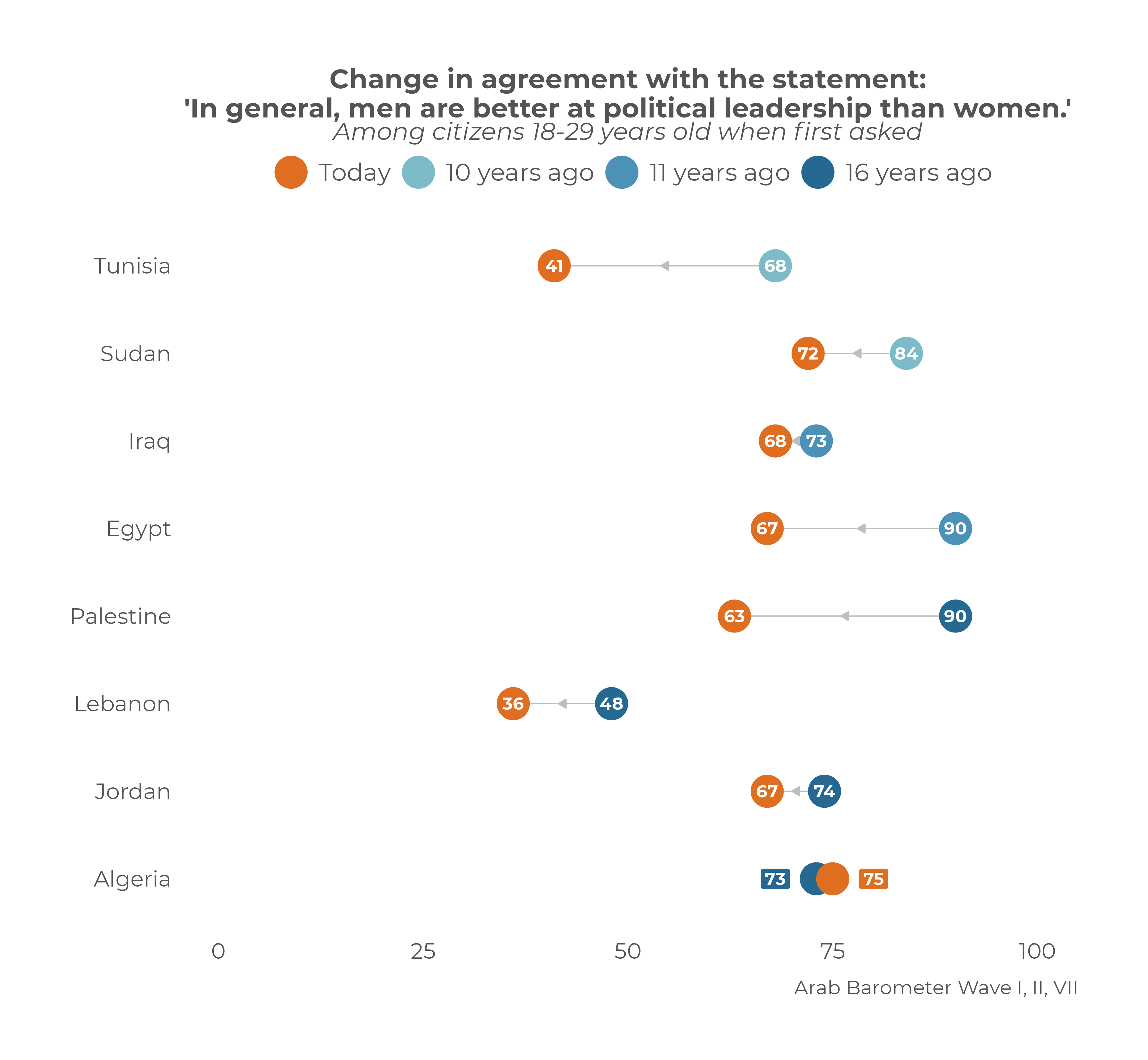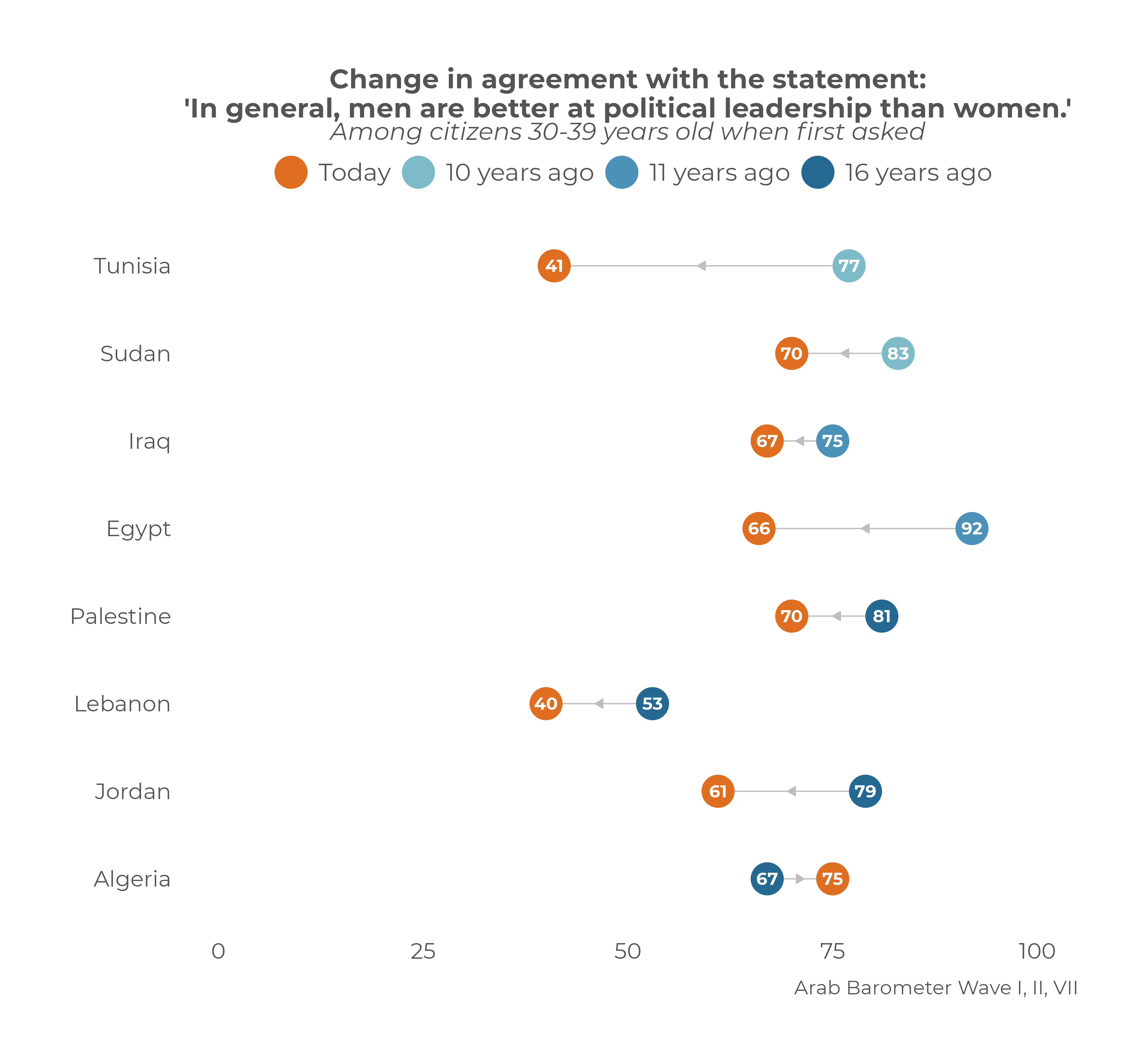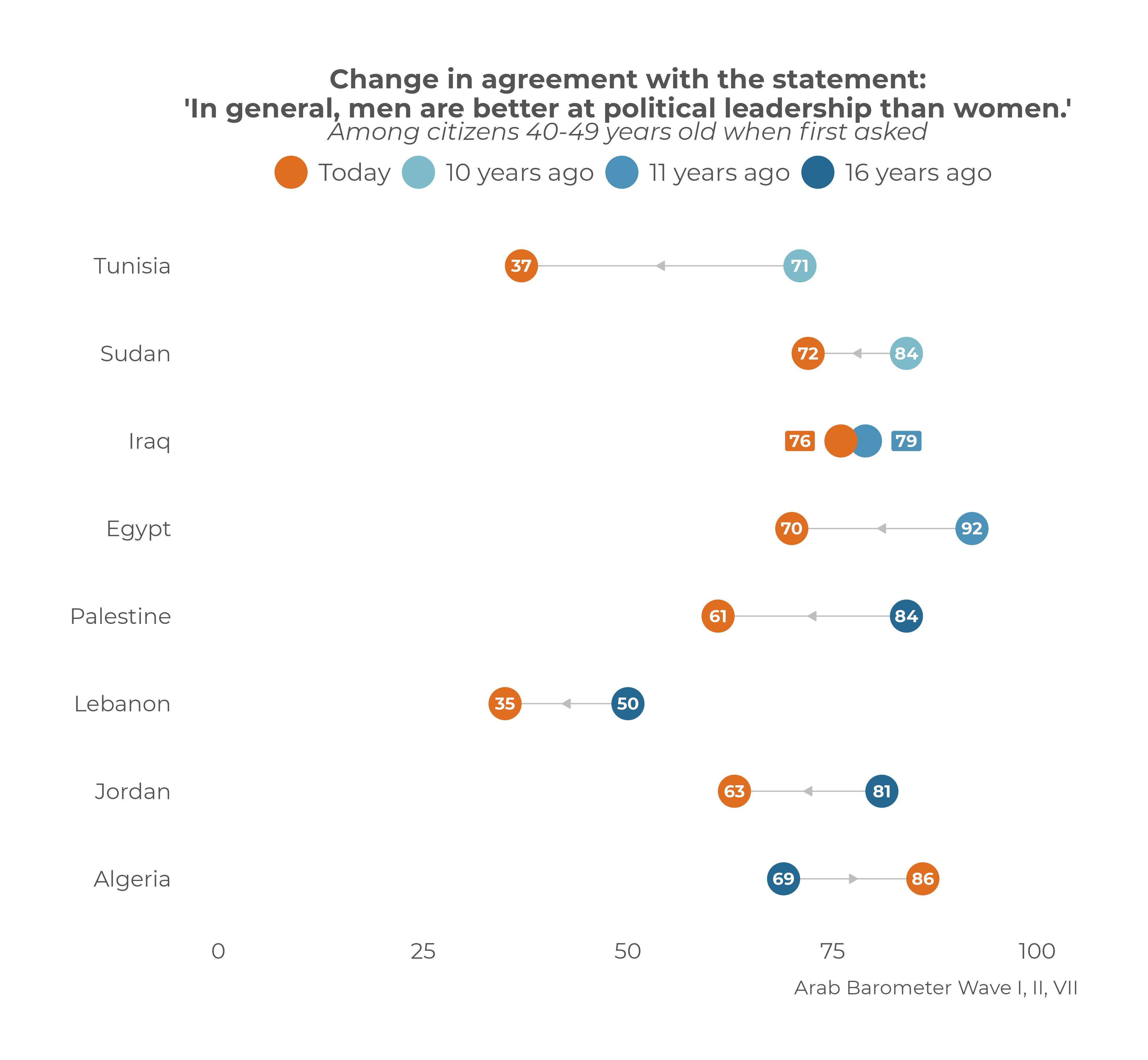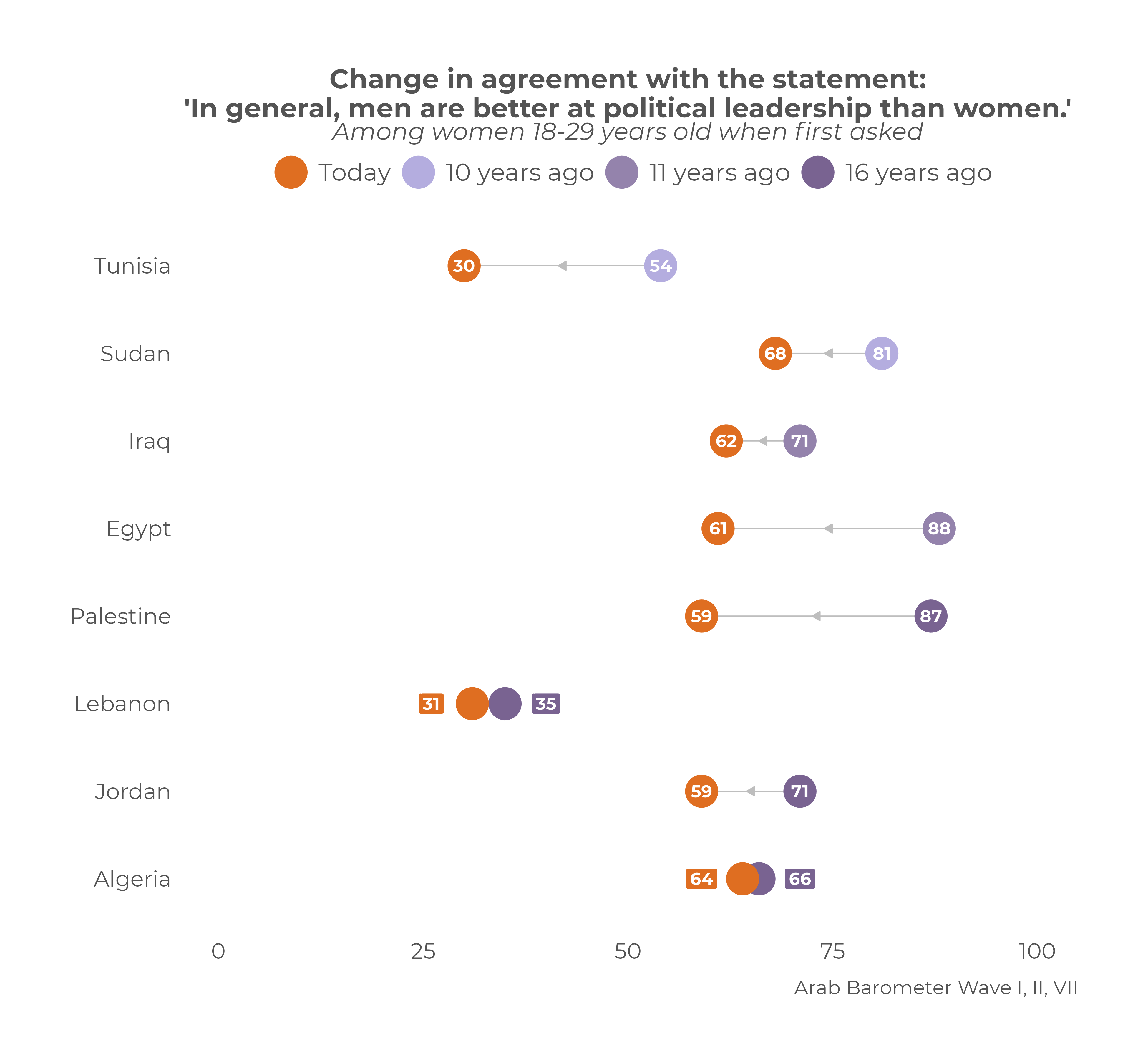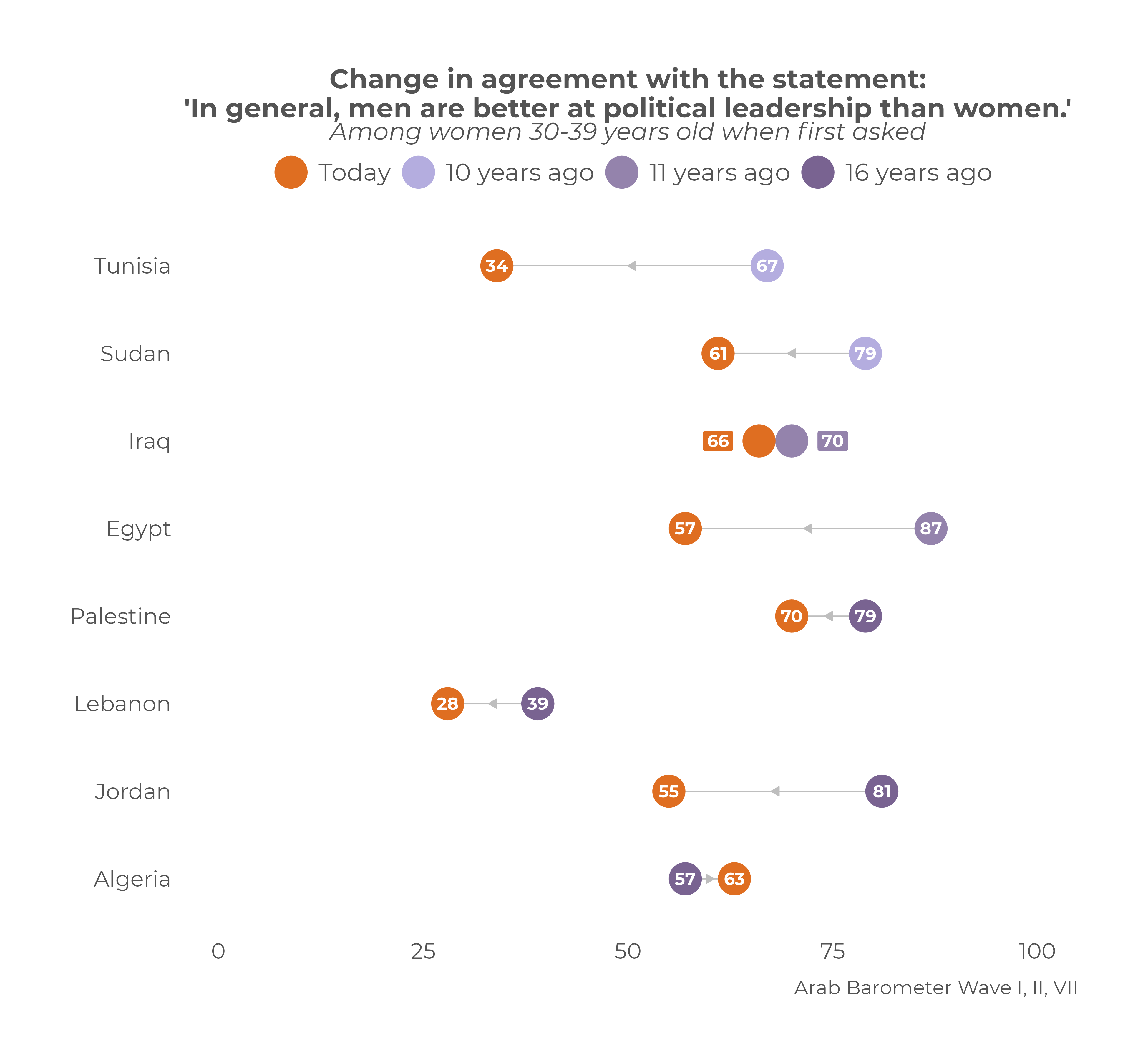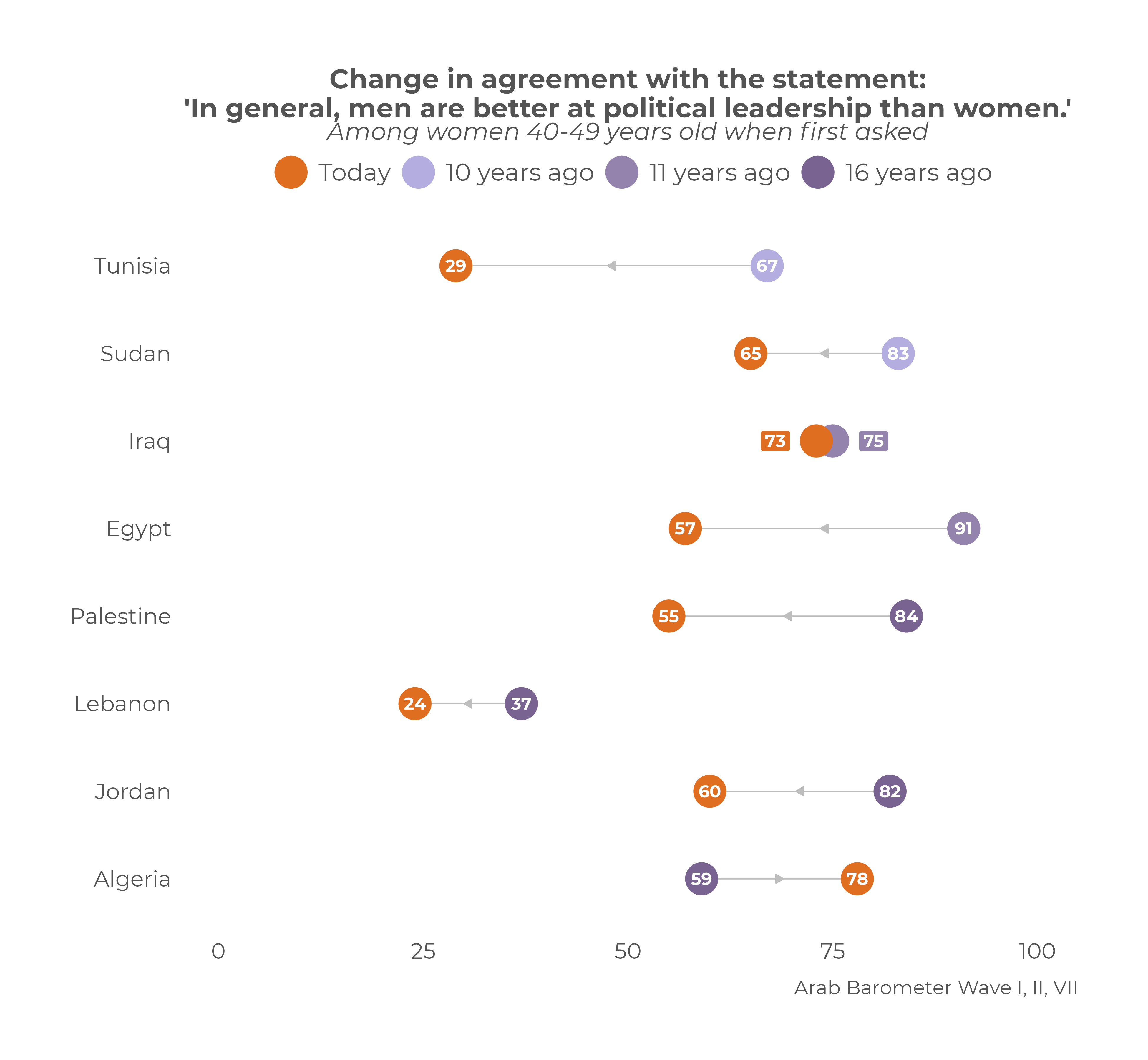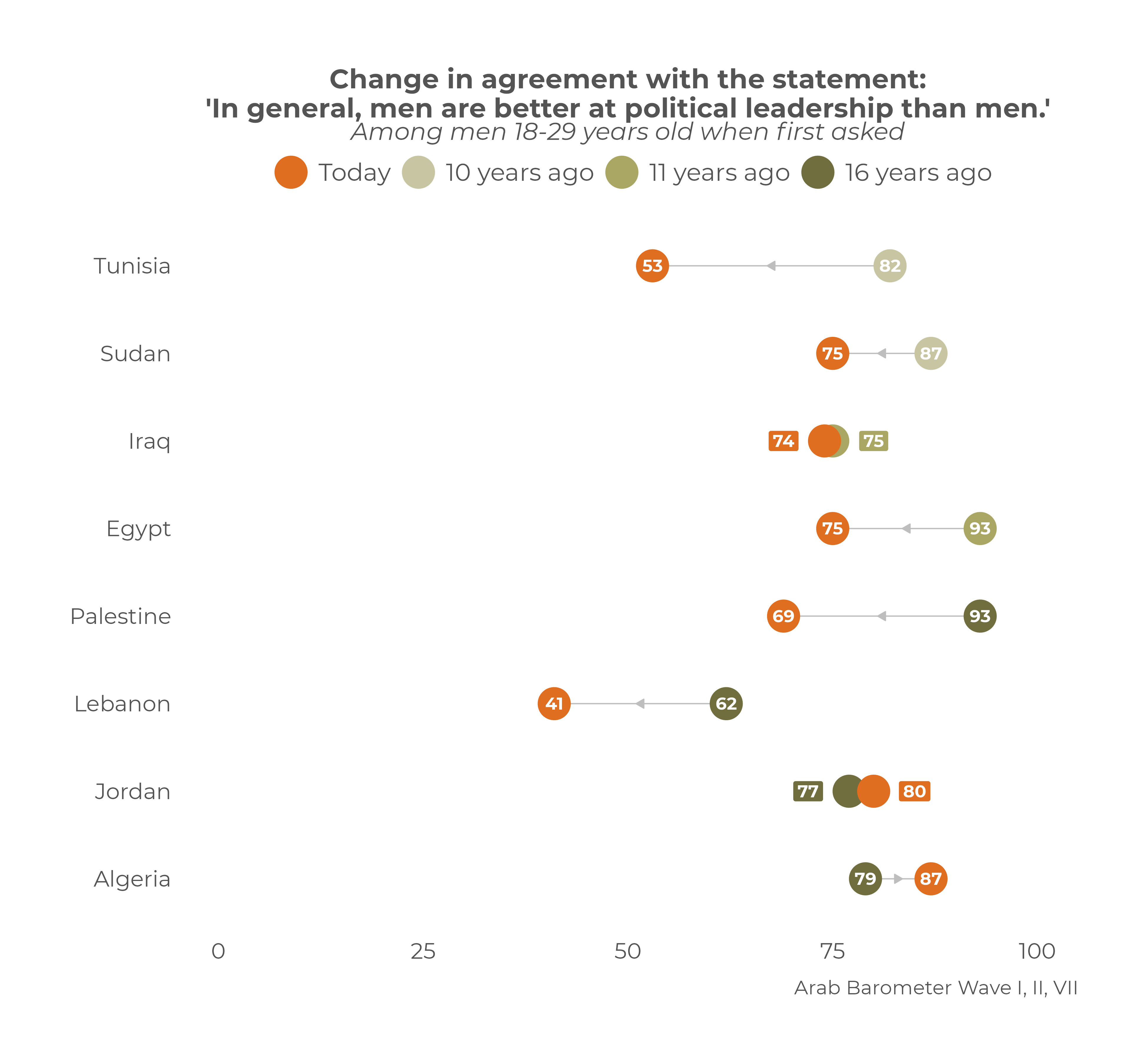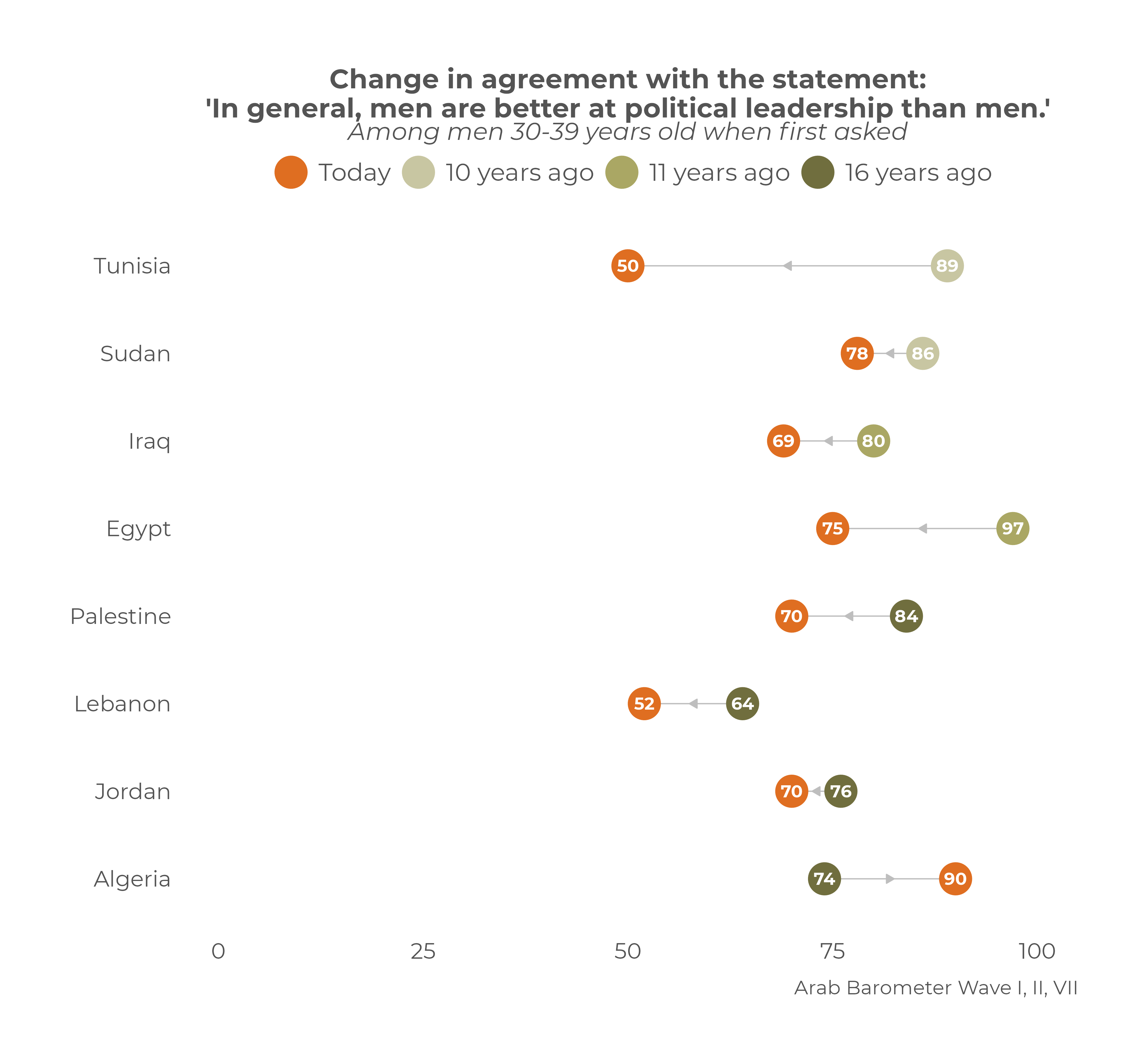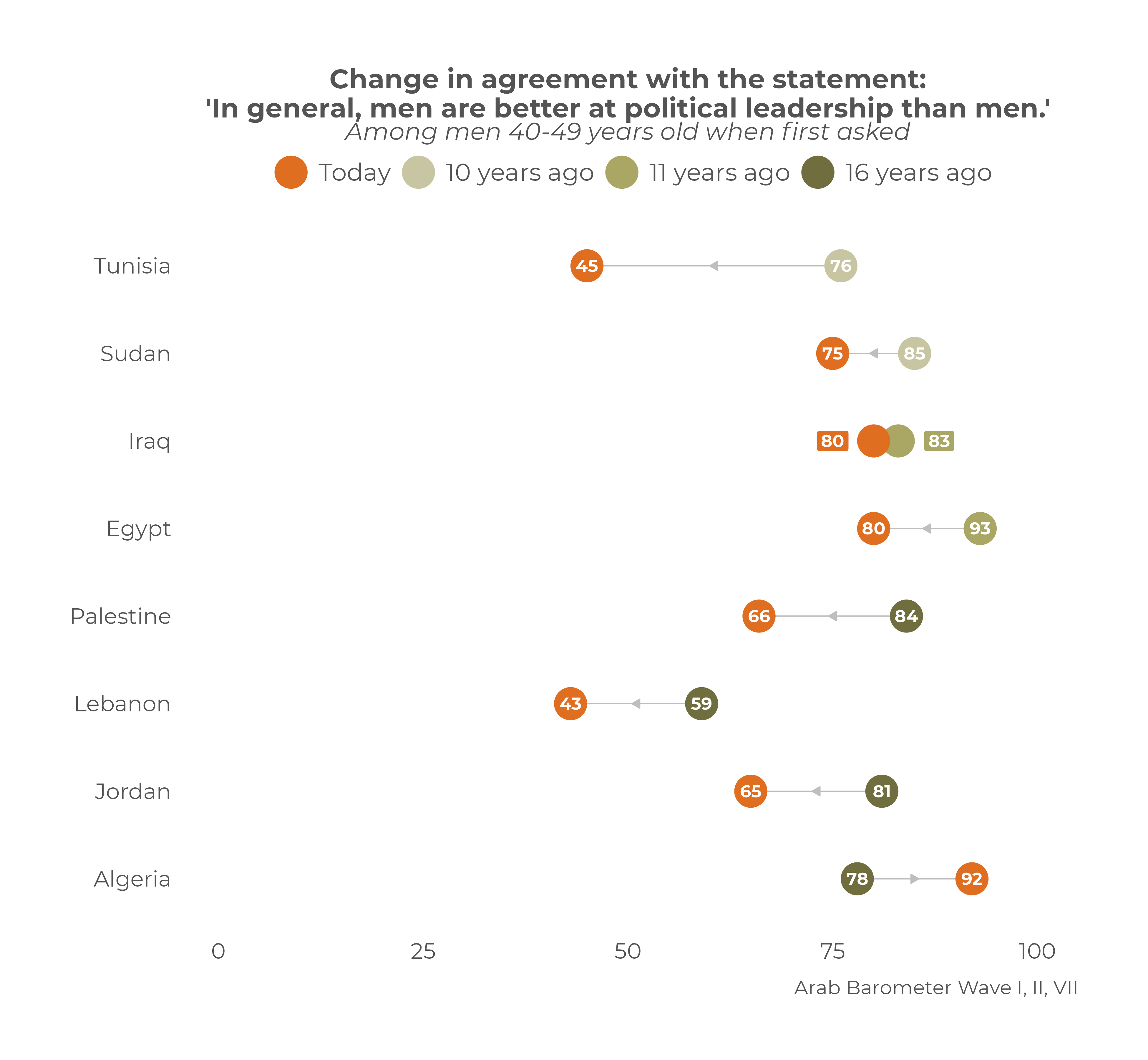Support for women as political leaders has dramatically increased inmost MENA countries according to Arab Barometer trend data. Disagreement with the idea that men make better political leaders than women is at an all-time high in eight of the eleven countries for which Arab Barometer has trend data.[1] Not only are these changes seen at the population level, but also within age cohorts. That is, citizens who were in their twenties, thirties, or forties ten years ago are today less likely to think men make better political leaders than women.
Eight of the countries Arab Barometer surveyed during its seventh wave were also surveyed at least ten years ago during the first or second wave.[2] This allows us to compare a nationally representative cross-section of different age groups to see how their opinions have changed since they were first surveyed. For this analysis, we broke the population up into three age cohorts. Cohort I consists of citizens who were 18 to 29 the first time they were surveyed; Cohort II is citizens originally aged 30 to 39; and Cohort III is citizens originally aged 40 to 49.[3] Except for a small overlap in Cohort I, the citizens in question have now [4] aged out of their original cohort.
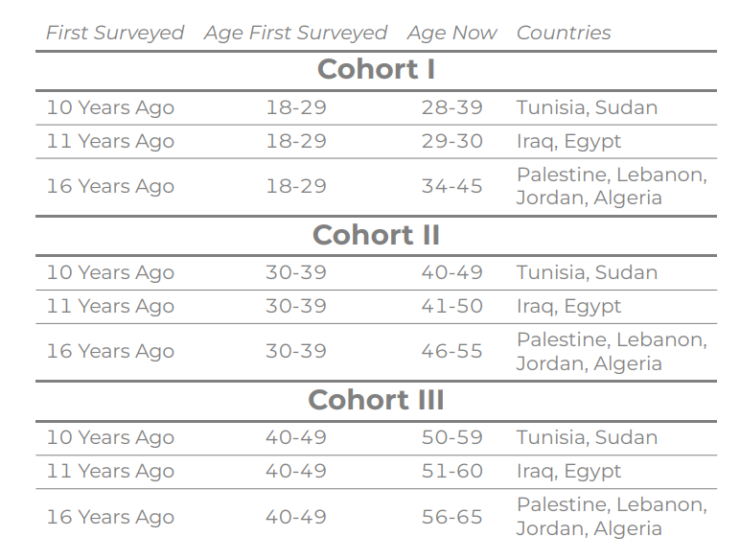
In a vast majority of cases, MENA citizens are changing their minds as they age. Specifically, most cohorts in most countries become increasingly unlikely to agree that men are better political leaders than women as they age.
Palestine is an especially interesting case. Arab Barometer first surveyed Palestinian citizens in 2006. At that point members of Cohort I (18-29 year-olds) were more likely than any other cohort to agree that men were better at political leadership than women. At the time, 90 percent of Cohort I agreed, compared to 81 percent of Cohort II (30-39 year-olds), and 84 percent of Cohort III (40-49 year-olds). Now, 16 years later, Cohort I has seen the biggest change. In 2021 Palestine, only 63 percent of citizens aged 34 to 45 [5] agreed with the statement; a 27-point drop. There was also an 11-point drop in the Cohort II and a 23 point drop in Cohort III.
Tunisian citizens experienced the most dramatic opinion shift across cohorts in the region. Only 41 percent of Tunisians who are in Cohort II today agree that men are better political leaders compared to 77 percent of them when they originally surveyed ten years ago. Similarly, Tunisians in Cohort III today dramatically shifted their views on women’s political leadership capabilities. Only 37 percent of them in 2021 think that men are better suitable for political positions compared to 71 percent of them when they were ten years younger in 2011.
Tunisia recently became the first Arab state to have a female prime minister. Prime Minister Najla Bouden was appointed by President Kais Saied in September 2021, shortly before Arab Barometer began surveying Tunisians. The recent sharp decline in agreement among Tunisian citizens favoring male political leadership from 2018 to 2021 following Bouden’s appointment is similar to the decline Arab Barometer recorded from 2011 to 2013, during which time legislative gender quotas were introduced.
Egyptians went from having the highest agreement (91 percent) that men are better political leaders than women among surveyed countries in 2011 to only the fifth highest agreement (66 percent) in 2022. Egyptians of all age groups experienced a significant opinion shift over time. Agreement dropped by 23 points in Cohort I, 26 points in Cohort II, and 22 points in Cohort III.
Female political representation in Egypt has risen dramatically from 2011 to 2022. Just prior to the Arab Spring, women took up only 1.5 percent of seats in the national legislature. As of the most recent Egyptian elections, 28 percent of legislative seats belong to women. Furthermore, the Egyptian constitution reserves 25 percent of local council seats for women and six women currently hold cabinet positions. The increase of successful female participation in the political sphere coincides with the dramatic decrease in Egyptians who think men are better than women at political leadership.
Conventional wisdom might suggest that the youngest group, Cohort I, would have the most flexible mindset. Instead, on average Cohort II (ages 30-39) sees the biggest change. Furthermore, the difference of means of Cohort I and Cohort III is negligible. This is actually in line with most psychological research which finds people become more open to new ideas as they age.
When the cohorts are broken out by gender, we see that men and women experience similar levels of opinion shift. Women tend to have slightly more drastic changes, but not always. For instance, Lebanese men in every cohort had larger change of opinion than women. This can be attributed to two reasons.
First, even though Lebanese citizens overall have arguably the most positive attitudes towards gender equality in the region, women in every country are much more likely than men to disagree that men are better political leaders. Lebanon is no exception. Second, although the change in Lebanese men’s opinion is larger than Lebanese women, with the exception of Cohort I, the change is not substantial. Even though agreement in Cohort I dropped only four points for Lebanese women, compared to 21 points for Lebanese men, the Lebanese women of Cohort I are still 10-points less likely the Lebanese men of Cohort I to agree that men are better political leaders than women. Overall, the opinions of men and women in Lebanon changed in parallel.
Finally, Algeria is worth focusing on. Algeria is the only country where the overall population is more likely to agree that men make better political leaders than women today than they were the first time they were surveyed. This is true of both Algerian men and women. Algerian women in Cohort I are the only group in Algeria to have a stable position; all other cohorts of both men and women in Algeria agree at least slightly more in 2022 than they did in 2006.
Just like other countries in the region, Algeria introduced gender quotes to its national elections in 2011. The quota increased the proportion of national legislative seats held by women from eight percent in 2011, prior the quota, to 32 percent after the 2012 election. The drastic increase in women’s political representation without an increase in fundamental support for women’s rights in education, the workforce, or the home led to fierce blow-back. The national discourse dubbed the female parliamentarians unqualified and the gender quota law was dropped. After the 2021 election, the proportion of seats held by Algerian women dropped from 26 percent to 8 percent; the same proportion held prior to 2011. The gender quota failure seems to have caused Algerians to increase their belief in differential political capabilities due to gender.
However, the 16-year overview belies more recent trends in Algeria. Although Algerian men seem to be losing faith in female political leadership, the same cannot be said of Algerian women. Disparagement of female parliamentarians without any prior experience led to a spike in agreement that men are better political leaders in 2016; however, Algerian women have started to have more faith in female political leaders. Agreement among Algerian women has dropped ten points over the last six years.
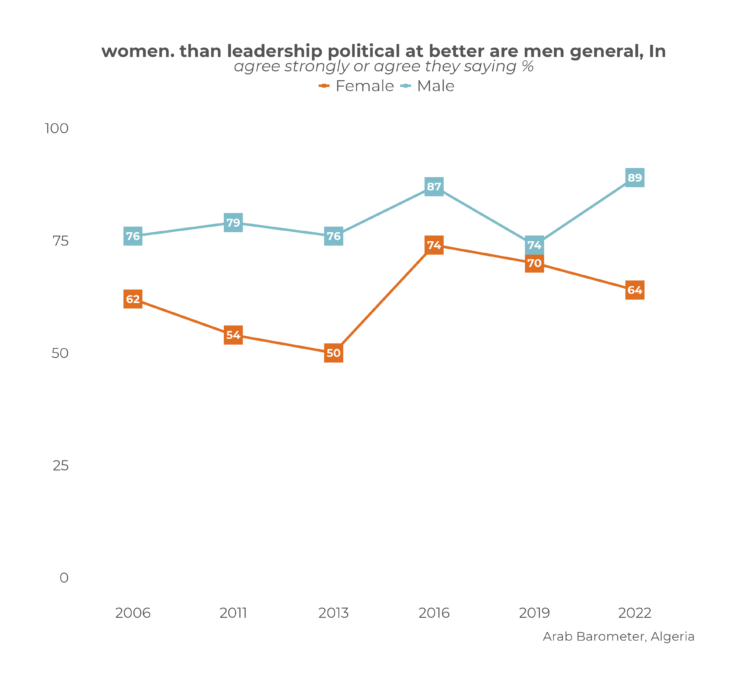
Representation is a key component in increasing citizen confidence in female political leadership, but it is not everything. In countries where women were meaningfully allowed to participate once elected, men and women across generations revised their biases. Algeria serves as a cautionary tale; even though women were nominally allowed to participate, a lack of support prevented women from effectively demonstrating their capabilities.
Overall, trend data regarding MENA citizens’ views on political gender equality is positive. As women across MENA continue to infiltrate the political sphere, we can expect respect for female political leadership to continue to grow.
[1] Those countries are: Egypt, Iraq, Jordan, Lebanon, Libya, Palestine, Sudan, and Tunisia.
[2] Morocco, a ninth country, was also surveyed during the first and second Arab Barometer
waves, but the data collect on respondent age was insufficient for this analysis.
[3] There are not enough citizens over 60 in most countries to have a reliable measure of opinion change for a cohort of individuals over 50.
[4] As of Arab Barometer Wave VII.
[5] This range come from the initial 18 to 29 plus 16 years.
